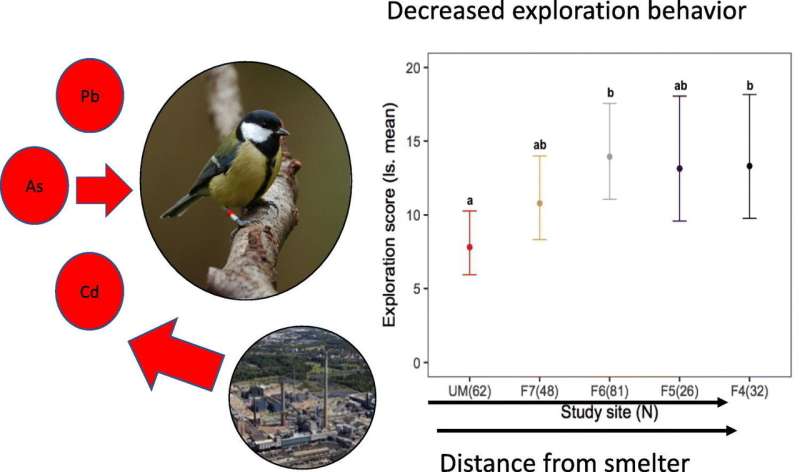March 26, 2018 report
Study results suggest wild birds suffer personality disorders due to ingestion of heavy metals

A team of researchers from the University of Antwerp has found evidence of heavy metal ingestion by wild birds causing changes in their personalities. In their paper published in Science of The Total Environment, the group describes the multiple ways they studied bird behavior near a site known for emitting cadmium and lead, and what they found.
Ingestion of heavy metals by humans can lead to a wide variety of physical and mental disorders, which caused the researchers to wonder what happens to birds that do the same. To find out, they set up and carried out a series of experiments meant to measure changes in personality in wild birds exposed to toxic metals.
The experiments all involved birds living near the Umicore facility, near Antwerp—it is a smelting and metal refinery center notorious for emitting lead and cadmium into the area around it. For their experiments, the team chose to focus on great tits, a popular songbird—specifically on five populations living at different distances from the metal refinery. To begin the study, the team captured 250 of the birds from the chosen sites and brought them back to their labs for study. The researchers observed them and recorded behavioral traits. They report that those birds captured closest to the metal refinery were the least active, and were also less curious. They report also that those closest to the smelting plant had the highest levels of the metals in their eggs and feathers.
In the second phase of the experiments, all of the captured birds were tagged and returned to the places where they had been captured. The team then monitored the behavior of all the birds in their natural environment and also when artificial factors were introduced, such as stuffed birds in nests to serve as an intruder, or recorded birdsong to mimic a competitor.
The team reports that the males became more aggressive towards the decoys the closer they lived to the smelting plant. In a similar vein, the females became more protective of their nests—behaviors that are uncommon in birds not exposed to metal toxins.
The researchers suggest that some of the changes in behavior they witnessed could prove deadly for the birds, making them easier for predators to capture.
More information: Andrea S. Grunst et al. Variation in personality traits across a metal pollution gradient in a free-living songbird, Science of The Total Environment (2018). DOI: 10.1016/j.scitotenv.2018.02.191
Abstract
Anthropogenic contaminants could alter traits central to animal behavioral types, or personalities, including aggressiveness, boldness and activity level. Lead and other toxic metals are persistent inorganic pollutants that affect organisms worldwide. Metal exposure can alter behavior by affecting neurology, endocrinology, and health. However, the direction and magnitude of the behavioral effects of metal exposure remain equivocal. Moreover, the degree to which metal exposure simultaneously affects suites of correlated behavioral traits (behavioral syndromes) that are controlled by common mechanisms remains unclear, with most studies focusing on single behaviors. Using a model species for personality variation, the great tit (Parus major), we explored differences in multiple behavioral traits across a pollution gradient where levels of metals, especially lead and cadmium, are elevated close to a smelter. We employed the novel environment exploration test, a proxy for variation in personality type, and also measured territorial aggressiveness and nest defense behavior. At polluted sites birds of both sexes displayed slower exploration behavior, which could reflect impaired neurological or physiological function. Territorial aggression and nest defense behavior were individually consistent, but did not vary with proximity to the smelter, suggesting that metal exposure does not concurrently affect exploration and aggression. Rather, exploration behavior appears more sensitive to metal pollution. Effects of metal pollution on exploration behavior, a key animal personality trait, could have critical effects on fitness.
Journal information: Science of the Total Environment
© 2018 Phys.org




















